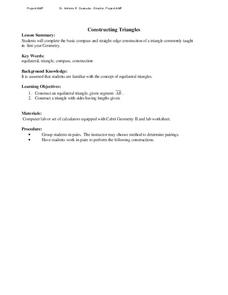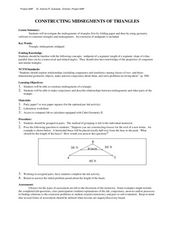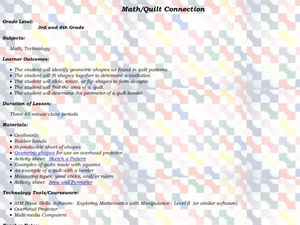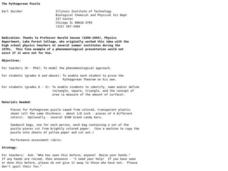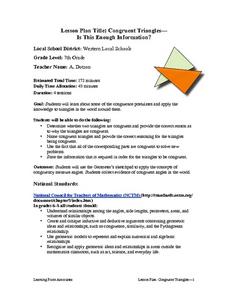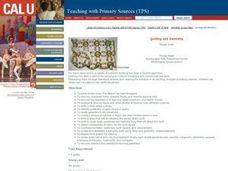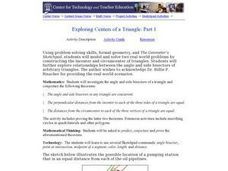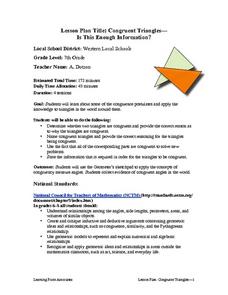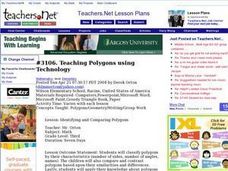EngageNY
Modeling Riverbeds with Polynomials (part 1)
Many things in life take the shape of a polynomial curve. Learners design a polynomial function to model a riverbed. Using different strategies, they find the flow rate through the river.
Curated OER
Constructing Triangles
Young scholars construct triangles. In this geometry lesson, students create equilateral triangles. They also construct triangles where the sides are different. They use the lab to create and move shapes around with the Cabri program.
Curated OER
Constructing Midsegments of Triangles
Students construct midsegments. In this geometry lesson, students make conjectures and apply properties of triangles to solve problems. They complete an activity on the computer.
Curated OER
Math/Quilt Connection
Students explore quilting. In this math patterns lesson, students define the perimeter of a quilt border, create tessellations using geometric shapes, and detemine the area of a quilt.
Curated OER
Getting it Right! An Investigation of the Pythagorean Theorem
In order to learn about the Pythagorean Theorem, young mathematicians investigate relations and patterns between different sides of a right triangle to look for possible relations among the squared sides. Once they have established the...
Curated OER
The Pythagorean Puzzle
An engaging hands-on activity is presented. Learners of all ages are addressed in thie unique plan. K-5 learners identify, name, and define a rectangle, square, triangle, and the concept of area. Older learners prove the Pythagorean...
Curated OER
Unit Circle and Triangle
Pupils apply the Unit Circle to solve ratios of triangles. In this geometry instructional activity, students derive the different ratios of a triangle using the Pythagorean Theorem. They find the angles of a unit circle using a right...
Curated OER
Right Triangles and Unit Circles
Students evaluate the six trigonometric values of a trig function. In this trigonometry instructional activity, students use the Unit Circle to find the values of right triangles and their angles. They identify an angle...
Curated OER
Pythagorean Theorem
Eighth graders draw right triangles and identify the parts of a right triangle: right angle, interior and exterior angles, hypotenuse and legs. They predict and identify any relationships that exist between the sides of a right...
Curated OER
Congruent Trianges - Is This Enough Information?
Seventh graders determine whether two triangles are congruent and provide an explanation to why they are not. They apply concepts of measurement of angles and collect evidence of congruent angles in the world.
Curated OER
Pythagorean Theorem Spreadsheet
Studetns use a spreadsheet to organize data on the sides of a triangle. They use the Pythagorean Theorem and the If then spreadsheet function to decide whether the three sides determine a right triangle. Young scholars work individual...
Curated OER
Geometry and Quilting
Students create a quilt square for a class quilt using at least three, two-dimensional geometric figures. They research and write a brief description of at least two different quilt patterns that they find. Pupils discuss that quilts are...
Curated OER
Exploring Characteristics Needed to Prove Two Trianlges Congruent
Tenth graders explore congruent triangles. In this geometry instructional activity, 10th graders investigate the conditions necessary to prove two triangles congruent. The instructional activity combines dry erase board...
Curated OER
Pythagoreum Theorem
Students practice assessing how to apply the formulas for the area of parallelograms and triangles. They recount the contributions of Pythagoras and apply the theories of the Pythagorean theorem in a group project to calculate the...
Curated OER
Exploring Altitudes in Math
Students draw and calculate altitudes. They draw the altitude of acute, right and obtuse triangles and calculate the altitude of a triangle using the Pythagorean theorem.
Curated OER
Exploring Centers of a Triangle: Part 1
Young scholars use problem solving skills, formal geometry, and The Geometer?s Sketchpad. They model and solve two real-world problems by constructing the in center and circumcenter of triangles.
Alabama Learning Exchange
Is It a Triangle?
Learners explore the concept of triangle inequalities. In this triangle inequality lesson, students cut spaghetti noodles into given lengths. Learners use the noodles to complete a worksheet about triangle inequalities. ...
Curated OER
Congruent Triangles - Is This Enough Information?
Seventh graders examine congruence postulates and apply knowledge to triangles in the world around them.
Curated OER
Exploring Centers of Triangles
Students explore properties of triangles using angle bisectors, incenters, circles, midpoints, and altitudes. They use Geometer's Sketchpad in order to create triangles and their properties.
Curated OER
Topos, Compasses, and Triangles, Oh My!
Young scholars triangulate using a compass, topographical (topo) map and a view of outside landmarks. They take a field trip to another location away from school and mark discernible landmarks (like mountains or radio towers) and changes...
Curated OER
Teaching Polygons using Technology
Third graders utilize different types of computer programs, such as Microsoft paint and Microsoft Word to study and create different types of polygons. They use PowerPoint to create a story about a shape and others that it meets during a...
Alabama Learning Exchange
Technology for Displaying Trigonometric Graph Behavior: Sine and Cosine
Students explore the concept of sine and cosine. In this sine and cosine lesson, students work in groups to graph sine and cosine functions. Students examine how coefficients in various parts of each parent function shift the...
Curated OER
Does Your Field Measure Up
Students measure angles using a plane table kit. In this geometry activity, students use trigonometric identities to find the values of the length of a football field.
Curated OER
Shapes Around Us
Students identify basic two-dimensional shapes. They are able to identify the four basic two-dimensional shapes: squares, rectangles, triangles, and circles. Students write/draw in their learning logs a reflection of what they noticed...



